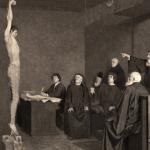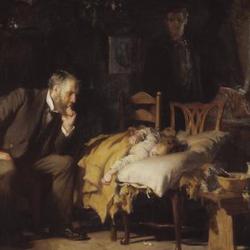In an essay in Sin, Death, and the Devil, Stanley Hauerwas describes our “sinsick” condition, drawing from Thomas for help.
Thomas links sin and sickness in a way that, Hauerwas says, strikes moderns as “bizarre”: “‘Sickness’ for us . . . is pointless. Being ‘sick’ is a condition that should not exist and thereby justifies unlimited interventions to eliminate what we regard as an arbitrary inconvenience” (15).
Thomas thought the opposite. Sickness isn’t pointless “but rather an indication of the distorting effect sin has in our lives. We are not created to be sick or to die, but because we discover our lives are unavoidably constituted by death and sickness, we have an indication something terrible has gone wrong” (15).
In short: “We are sinsick” (15).
This seems like bad news, but Hauerwas again argues the opposite: “Aquinas’s way of framing our understanding of sin, sickness, and death . . . offers exactly the kind of discriminations necessary to sustain a practice of medicine that will not be driven ma by its inability to cure” (15).
He concludes: “Christian and non-Christian find ourselves dominated by our ‘concern for health’ . . . because medicine in the absence of the church cannot help but dominate our lives. For medicine has become a powerful practice without end, without context, without any wider community to give it purpose” (21).
What we need is “for Christians to recover a Christian practice of medicine shaped by the practices of the church, and in particular, baptism. . . . it is through baptism that we are introduced to undistorting desire through the pacific imitation of Christ.” When our lives are “determined by that reality – that is, the reality of life with God” then n “how sickness is understood and cared for cannot help but look quite different than how the world understands what it means to be sick” (21).















